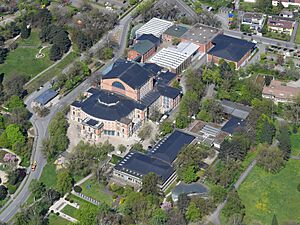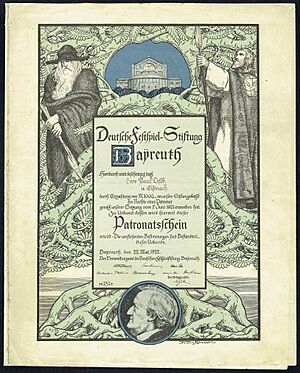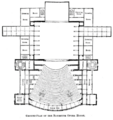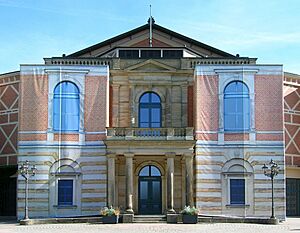Bayreuth Festspielhaus facts for kids
Quick facts for kids Richard Wagner Festspielhaus |
|
|---|---|
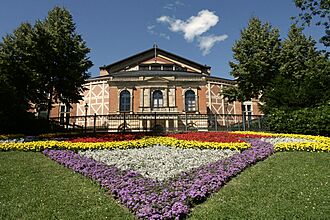
The Festspielhaus, home of the Bayreuth Festival, in 2006
|
|
| General information | |
| Location | Bayreuth, Bavaria, Germany |
| Coordinates | 49°57′36″N 11°34′47″E / 49.96000°N 11.57972°E |
| Groundbreaking | 1872 |
| Opened | 1876 |
| Design and construction | |
| Architect | after Gottfried Semper |
The Bayreuth Festspielhaus (say "Bye-royt Fes-tshpeel-hows") is a special opera house in Bayreuth, Germany. A famous German composer named Richard Wagner built it in the 1800s. This building is unique because it's only used to perform Wagner's own operas. Every year, the Bayreuth Festival takes place here. It's like a big party for Wagner's music! The official name is the Richard Wagner Festspielhaus. It's also home to the Bayreuth Festival Orchestra.
Contents
Building the Festspielhaus: A Dream Come True
Richard Wagner designed the Festspielhaus. He used ideas from another architect, Gottfried Semper. Wagner worked with architect Otto Brückwald to build it.
The main money for the building came from Ludwig II of Bavaria, who was the king. The first stone was placed on May 22, 1872. This was Wagner's 59th birthday. The building first opened in August 1876. It was for the first full performance of Wagner's famous opera series, Der Ring des Nibelungen. This means The Ring of the Nibelung.
Unique Design Features of the Opera House
The outside of the Festspielhaus looks quite simple. Only the front entrance has fancy decorations. The rest is mostly plain bricks. But the inside is very special! It's mostly made of wood. This helps the sound echo for about 1.55 seconds. The Festspielhaus is one of the biggest wooden buildings ever built without extra support.
Unlike most opera houses, it doesn't have many levels of seats. Instead, all the seats are in one steep section. It's shaped like a wedge. There are only a few small viewing areas at the very back. This design is called "continental seating." Many modern movie theaters use this style now. It means everyone gets a clear view of the stage. The Festspielhaus can hold 1,925 people.
The "Mystic Gulf" and Stage Magic
The Festspielhaus has a special stage design. It has a double archway in front of the stage. This makes the stage look farther away than it is. The orchestra pit is also hidden. Wagner called this a "mystic gulf." It creates a dreamlike feeling for the audience. It also helps everyone focus on the story on stage. This design made Wagner's operas sound and look amazing.
Building the Festspielhaus was hard. Wagner needed a lot of money. He traveled and put on concerts to raise funds. Even the Sultan Abdülaziz of the Ottoman Empire helped with money. These tours were very tiring for Wagner. They even affected his health.
The Hidden Orchestra Pit: A Special Sound
A very important part of the Festspielhaus is its unusual orchestra pit. It's hidden completely under the stage. A cover hides it from the audience. Wagner wanted the audience to focus only on the drama. He didn't want them distracted by the musicians.
This hidden pit also helps balance the sound. The singers' voices and the orchestra's music blend perfectly. This creates the ideal sound for Wagner's operas. Only his operas are performed here.
However, this design makes it very hard for conductors. The pit is dark and crowded. The sound echoes, making it tough to keep the orchestra and singers together. Conductors have to learn new ways to lead the music. They must ignore cues from the singers.
How the Orchestra is Arranged
The orchestra in Bayreuth is set up in a unique way:
- The first violins are on the conductor's right side. Usually, they are on the left. This helps direct their sound towards the stage. The sound then bounces back to the audience.
- The double basses, cellos, and harps are split into groups. They are placed on both sides of the pit.
- Most of the orchestra is directly under the stage. This means many players can't see or hear the singers. So, communication with the conductor is super important. This setup creates the huge, rich sound Wagner wanted.
The Bayreuth Festival: A Yearly Tradition
The Festspielhaus is still the home of the yearly Bayreuth Festival. During this festival, Wagner's later operas are performed. These include the Ring cycle and Parsifal.
Images for kids
Recent Updates and Repairs
Around 2012, people noticed the building needed repairs. The roof was leaking, and the red brick walls were crumbling. In 2014, money was set aside for the repairs. About €30 million was given. Most of this money came from the German government and the state of Bavaria.
The repairs were finished on July 26, 2015. Now, the building is fully restored and looks great!
See also
 In Spanish: Festspielhaus de Bayreuth para niños
In Spanish: Festspielhaus de Bayreuth para niños
- List of opera festivals
- List of Bayreuth Festival productions of Der Ring des Nibelungen
External links
no:Festspillene i Bayreuth
 | Precious Adams |
 | Lauren Anderson |
 | Janet Collins |


